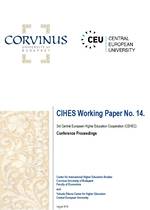NFKK FÜZETEK 14
3rd Central European Higher Education Cooperation Conference Proceedings
Szerkesztette: Kováts Gergely – Szabó Mátyás
2018 augusztus
ISSN 2060-9698
ISBN 978-963-503-715-5
230 oldal

A kiadvány letölthető (angolul) ide kattintva:
Kapcsolódó dokumentumok
A 3. CEHEC (CEHEC2017) konferencia honlapja elérhető ide kattintva.
This volume comprises papers presented at the third Central European
Higher Education Cooperation (CEHEC) conference held in Budapest on
April 24-25, 2017.The event was part of a
series of conferences organized by the CEHEC project, an initiative of
the Center of International Higher Education Studies (CIHES) at Corvinus
University of Budapest and Yehuda Elkana Center for Higher Education at
Central European University (CEU). CEHEC has multiple goals. First, it
aims to create a forum for sharing experiences and good practices, for
discussing challenges, progress and opportunities for academic
collaboration, and for policy discussion in the region’s higher
education. Second, it builds a professional network that can provide
support to relevant stakeholders. Last but not least, the series of
conferences that emerged from this cooperation seek to provide more
visibility to Central and Eastern Europe in the global higher education
landscape and recreate the attractiveness the region had in the 1990s
for researchers and policy makers.
The
CEHEC conference series intends to bring together researchers and
practitioners who share a continuous interest in promoting both the
scholarly study and the practical advancement of higher education in the
Central and Eastern European region. The third CEHEC conference,
entitled “Worry or Not – Higher Education in Central and Eastern Europe.
Current Trends and Scenarios for the Near Future” aimed to scrutinize
the chief reforms in higher education in the region over the past
decade, identify the most important current trends and discuss possible
future scenarios for the near future in the light of an atmosphere of
declining enthusiasm and support for higher education.
Published studies:
- Kari KUOPPALA: The Finnish Management by Results Reform in the Field of Higher Education
- Gabriella KECZER: Initial Concerns and Experiences Regarding Community Higher Educational Centers in Hungary
- Kateryna SUPRUN, Uliana FURIV: Governance equalizer: Ukrainian case study
- Jan L. CIEŚLIŃSKI: Old and new funding formula for Polish universities
- Anastassiya LIPOVKA: Raising Gender Equality in Kazakhstan through Management Education Modernisation
- Valéria CSÉPE, Christina ROZSNYAI: Trends and Challenges in Hungarian Higher Education Quality Assurance Teaching, Learning and Research
- Nicholas CHANDLER , Gábor KIRÁLY, Zsuzsanna GÉRING, Péter MISKOLCZI, Yvette LOVAS, Kinga KOVÁCS, Sára CSILLAG: When two worlds collide: cheating and the culture of academia
- Matild SÁGI, Marianna SZEMERSZKI: Reforms in Teaching Professions and Changes in Recruitment of Initial Teacher Education in Hungary
- Tamás JANCSÓ: The role of university identity and students’ opinions of each other in the university’s operation: through the example of Eötvös Loránd University Budapest
- Zsuzsa M. CSÁSZÁR, Tamás Á. WUSCHING: Trends and Motivations Behind Foreign Students’ Choice of University in Three Hungarian Provincial University Towns
- Samir SRAIRI: Determinants of student dropout in Tunisian universities
- Éva PÁLINKÓ, Zsófia VIDA: How to achieve high scientific impact in SSH research projects? Findings of a case study
- Aleš VLK, Šimon STIBUREK: Diversification, Autonomy and Relevance of Higher Education in the Czech Republic